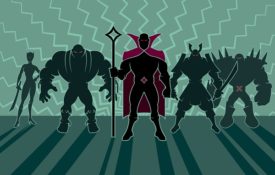-
This is How COVID-19 Could Change the World of Work for Good
Around half of the world's population is on lockdown in an attempt to stop the spread of COVID-19, a public health emergency that has claimed thousands of lives and sparked fears of the worst global recession since the Great Depression. This has had a profound impact on the world of work, as well as our mental and physical well-being. While nobody would choose to go through this crisis, social scientists, management professors and psychologists around the world are watching closely, keen to investigate the effects of this enforced global experiment.
-

Science Says We Prefer Fictional Villains Who Remind Us of Ourselves: Interview with author Rebecca Krause
People may find fictional villains surprisingly likeable when they share similarities with the viewer or reader.
-
The Perks of Being a Weirdo
My childhood was, by most definitions, pretty strange. I grew up a Russian Jewish immigrant in Midland, Texas, in a region whose biggest claims to fame are being the onetime home of George W. Bush and the inspiration for Friday Night Lights. In preschool, I got in trouble for not praying before eating my snack; later, I didn’t know what this “Super Bowl” everyone kept talking about was. I felt hopelessly different from everyone else in our town. Even after we moved to a Dallas suburb, I never encountered another Russian immigrant kid like me. I rode the bus alone. I spent almost every evening alone. I began talking to myself—a habit that has unfortunately stuck.
-
3 Ways the Coronavirus Pandemic is Changing Who We Are
APS Member/Author: Arie Kruglanski For most Americans, the coronavirus pandemic represents a completely unprecedented circumstance, as novel as it is life-changing. No event in recent history has affected us as profoundly and pervasively. Not only does it remind us of our physical fragility, it undermines economic security, throws daily routines topsy-turvy, wreaks havoc on plans and isolates us from friends and neighbors. ... This crisis has induced wide reaching uncertainty. We do not know what to think or how to make heads or tails of these completely unfamiliar circumstances. Who will be affected? Will our loved ones? How quickly? Will tests be available? Will we survive?
-

From Voldemort to Vader, Science Says We Prefer Fictional Villains Who Remind Us of Ourselves
People may find fictional villains surprisingly likeable when they share similarities with the viewer or reader. [April 22, 2020]
-
Use Social Isolation As A Time To Create Good Habits
Most of us don't consciously recognize when we are creating a habit. Habits are automatic ways of doing, seeing and acting. It's a subconscious routine. Psychologist Wendy Wood, author of Good Habits, Bad Habits: The Science of Making Positive Changes That Stick, suggests that "a habit is a sort of a mental shortcut to repeat what we did in the past that worked for us and got us some reward." According to Wood's research, about 43% of what we do in a day is repeated automatically in the same context. Habits can be good for us, like brushing our teeth, but they can also be bad for us, like venturing to the refrigerator too many times. How long does it take to create a habit?

